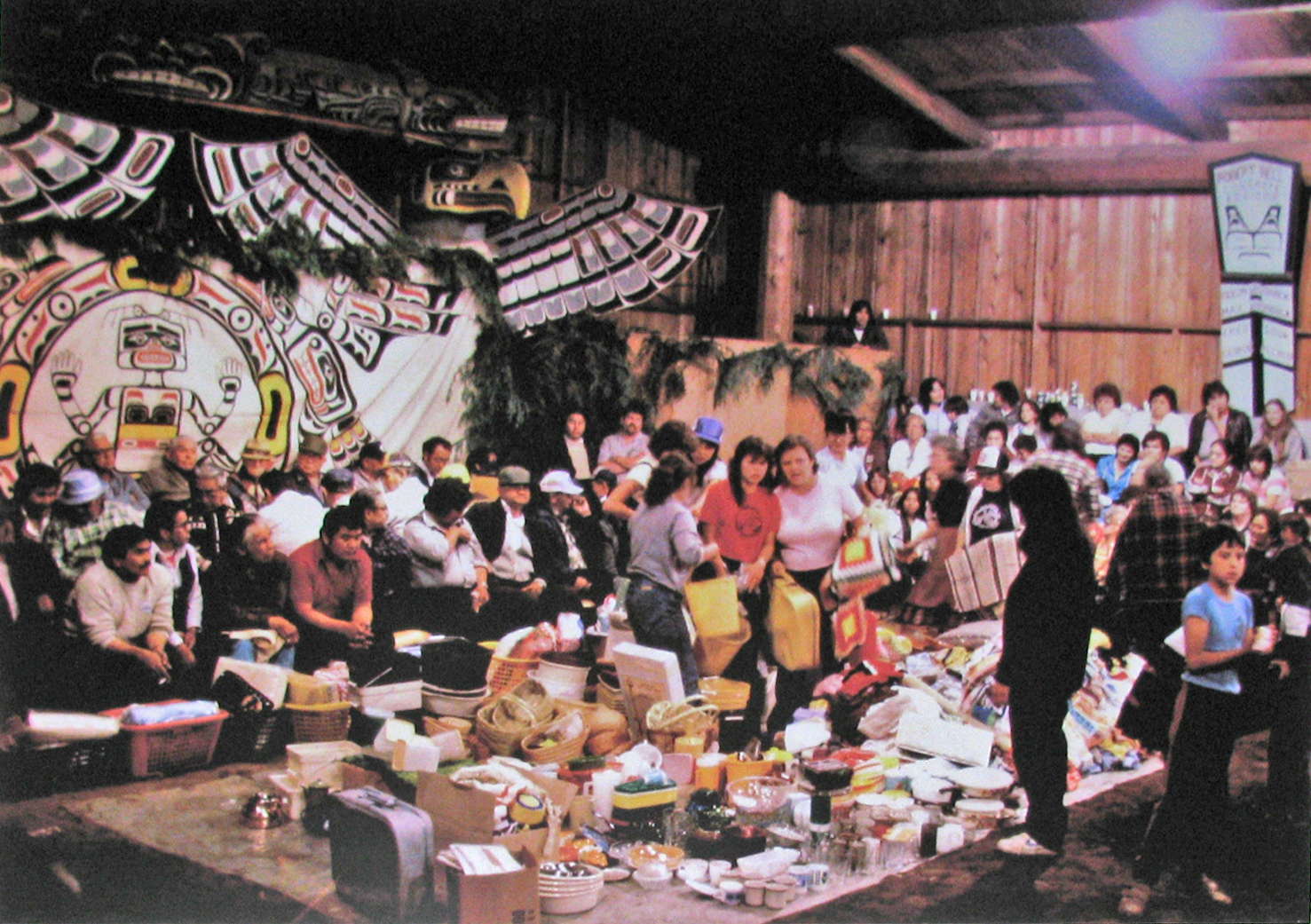The potlatch is a ceremony practiced among indigenous groups of the Northwest coastal regions of Canada and the United States in which families come together to celebrate births, give names, conduct marriages, mourn the loss of a loved one, or pass rights from a Chief to his eldest son. The word potlatch derives from the Chinook language, and means “to give”. Accordingly, at the end of the ceremony, the host gives gifts to all in attendance. A host can achieve a high status in their community by giving out a large quantity of gifts. In exchange, witnesses are expected to remember and pass on the knowledge of the events they have witnessed. A website written by members of the Kwakwa̱ka̱’wakw, a group that practices the potlatch, states that the potlatch ceremony is “the very foundation for a system of laws by which we have always lived and continues as the cornerstone of our culture today” (umista.org).

In 1885, the Canadian government outlawed potlatch ceremonies. Christian missionaries feared the pagan implications of these ceremonies, and the government felt threatened by the distribution of wealth and anti-capitalist connotations of the ceremony. The Canadian Superintendent General of Indian Affairs, John A. Macdonald, called the potlatch, “the useless and degrading custom in vogue among the Indians … at which an immense amount of personal property is squandered in gifts by one Band to another, and at which much valuable time is lost” (nativeamericannetroots.net).
True enforcement of the law began in 1913. The number of arrests for potlatching increased dramatically, but individuals could often received lesser sentences if they pledged to stop engaging in potlatching or handed over potlatch paraphernalia, such as masks, whistles, cedar bark regalia, and coppers. Over 750 objects were confiscated, and the Canadian Department of Indian affairs paid a total of $1,485 for more than $35,000 worth of objects. Most of these objects were then sold or given to museums or individuals for display.

Clearly, the outlawing of the potlatch ceremony is awful and discriminatory. For individuals to be arrested for singing, dancing, or giving gifts, simply because these actions were part of a certain cultural practice, is unlawful and represents violence towards these tribes’ cultures and history. Since the confiscation of these objects however, there has been some progress made towards justice. The Kwakwa̱ka̱’wakw protested the anti-potlatching laws, using petition and other legal means, though these efforts were unsuccessful for a long time. Many indigenous groups continued to practice potlatch ceremonies in secret, and in 1951, the section making potlatch ceremonies illegal was deleted from Canadian law, though some Native tribes say they would have preferred a repeal, which would have brought more public attention to the issue.

Once potlatching became legal, many Native individuals and tribes worked to get back the objects that were illegally taken from them. In the 1970’s the Kwakwa̱ka̱’wakw formed the U’mista Cultural Society, which petitioned the Canadian government for the return of the objects. Though this was certainly a step in the right direction, the burden of proof that these objects were illegally obtained rested on the Native peoples, and even when that burden of proof was met, the government would only agree to repatriate the objects if a museum was constructed to properly preserve them. The U’mista Cultural Center in Alert Bay, British Colombia now houses many of these objects. Though I appreciate the progress in the repatriation of these objects and the recognition by the Canadian government that they were obtained illegally, I find it patronizing and unfair for the government to stipulate the conditions under which the objects will be returned. If the government truly recognizes that these objects belong to the Native peoples they were taken from, then it should be up to those tribes what happens to the objects upon repatriation. To force these objects to be housed in museums, in my mind, reinforces the idea that these are dying cultures that must be preserved and devalues the cultural traditions of these Native people while further reducing their agency over their own rightful possessions.
Further readings:
http://www.umista.org/masks_story/en/ht/potlatch01.html
http://nativeamericannetroots.net/diary/631
http://www.umista.ca/exhibits/index.php
http://www.cbc.ca/news2/background/aboriginals/aboriginal_artifacts.html
Images:
First image: http://firstpeoplesofcanada.com/fp_groups/fp_nwc5.html
Second Image: http://firstnationsrituals.blogspot.com/p/the-potlatch-ceremony.html
Third Image: http://www.donsmaps.com/potlatch.html
